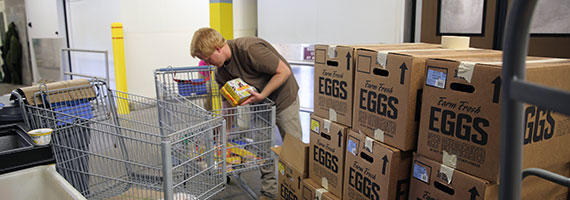Good news: a lot of unsold commissary food is feeding the hungry at food banks around the country.
Remember that time in 2013 that the government shut down and most commissaries were completely closed for five to six days, depending on where they were located?
Commissary officials found themselves during that drama with a lot of food that couldn't be sold. It wasn't exactly bad ... it just didn't live up to sellable standards. So they donated it.
That doesn't seem like that shocking of an idea. But like all government agencies, the Defense Commissary Agency (DeCA) has a lot of rules. And one of those rules, since 1985, was that they could only donate to food banks that had bothered to be certified by the DoD, the Health and Human Services administration, the Veterans Administration or certain veterans organizations. That was kind of a hassle, and food banks hadn't done the work to make it happen.
When the shutdown happened, DeCA received special, short term permission to give food to non-certified food banks. And ever since then, agency officials said, they have been working to get food banks back on the approved list so they can continue donating.
""We really pushed the button to encourage food banks to seek permanent designation," Randy Eller, deputy director of DeCA's logistics directorate, said in a recent DeCA news release. "Many did, and that's how the whole thing just kept on rolling."
Since the shut down the commissary has donated four million pounds of food to food banks across the U.S., officials said. And they expect to donate about two million pounds this year alone.
Food banks generally accept "non-perishable" food up to six months after its "best-by" dates. And perishable food is accepted if it's still good but not sellable for cosmetic or other reasons. Everything donated is certified as edible first by a food inspector.
You're probably thinking "why doesn't the commissary just mark down those items instead of donating them?" (Not that donating is bad).
The answer is that they actually do. But when items become unsellable because they don't live up to standards (like produce) or have actually reached their expiration date, they are either donated or sold back to the vendor (who then often donates the items themselves), commissary officials said.
"The majority of our donations are produce culled daily in commissaries which is edible but does not meet our quality standards for resale," Kevin Robinson, a commissary spokesman, told me a statement. "Next to produce, we donate general grocery products, none of which can be sold because they're close dated or expired items -- all of which have been approved for donation by Environmental Health."
(Unsolved mystery: how the quality standard on strawberries - I know, I know stop complaining about the strawberries, Amy .. BUT I CAN'T - is good for humans at all if they are any worse off than they were when I saw them and decided they were too rotten to buy.)
You might also be feeling a little annoyed that while officials are constantly toying with unfunding the commissary system, DeCA is busy giving what they do have to food banks. I can see how you feel that way.
But commissary officials said that really, in the great scheme of things, four million pounds of food isn't that much -- only about one percent of what they do sell worldwide.










